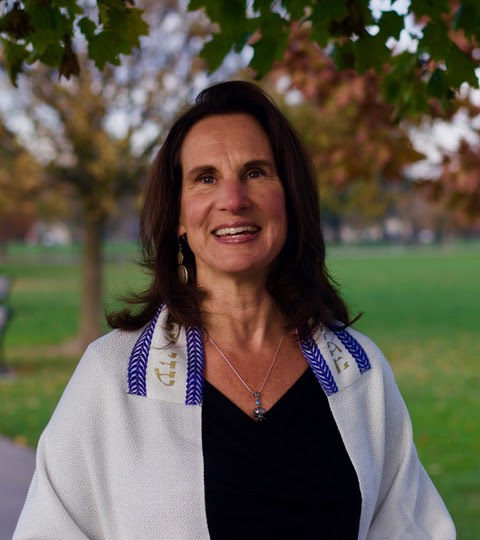Let’s face it: change is usually slow. Confronting the institutional injustices we see at all levels of government and many parts of corporate America, it’s hard to know which of the two moves slower. As we persist, we need opportunities to renew our hope and inspire others to continue working to bring about desperately needed change. From where do we draw strength? This week’s parshah contains one of my “go to” messages for nourishment and strength, a reminder that the Divine Indwelling Presence is always with and within me and that I am a mikdash when I bring my heart’s terumah.
This week’s parshah quickly surrounds us with exquisitely detailed instructions. (If only God wrote instruction manuals for modern home improvement projects!) First, however, God equips us with a deep sense of connection and purpose through heart, head, soul, and body. Recognizing the need of b’nei Yisrael to hold onto their dramatic sense of encounter with the Divine after Sinai, God creates a beautiful process to inspire and elevate the Israelites while also providing structure. We are to bring terumah/gifts (literally, that which elevates or uplifts) to offer to the Divine according to the guidance of our hearts. Our gifts and our labor will create the mikdash/sanctuary for Shekhinah: “וְעָ֥שו לִ֖י מִקדָש וְשָכַנְתִי בְתוכָם” “And let them make for Me a sanctuary that I may dwell among them,” or, as I prefer, “within them.” (Ex. 25:8)¹
God asks us to make a sanctuary for the Divine Indwelling because when we invest and participate in building something — whether a physical structure or a social movement — we are more deeply engaged. By creating within ourselves a refuge, a holy space, a mikdash in which the Sacred dwells, we are better able to feel and recognize each minute detail as meaningful progress.
Because central Ohio is home to Wendy’s, I have had many opportunities over the past five years to interact with Wendy’s corporate headquarters, local restaurants, and The Ohio State University to encourage Wendy’s to join the Fair Food Program. My work as an ally of the Coalition of Immokalee Workers (CIW) has taught me a great deal about what it means to offer my gifts to a complex project and the importance of being deeply mindful of following set, detailed instructions. The order in which CIW works toward assembling a “sanctuary” for farmworkers is frequently different from what I might propose. In following the lead of farmworkers, I have repeatedly had to grapple with my “white” privilege and with the status privilege I carry as a “recovering litigator” and rabbi.²
During my most recent protest experience at a Wendy’s franchise, several of my clergy colleagues, accustomed to utilizing their privilege, wanted to stay to address a store manager (who immediately called the police) and to educate customers. As allies, however, we do not set the detailed plan for an action – we support it. Our instructions were: as soon as we encountered resistance, we were to return to our vigil across the street. This strategy of avoiding confrontation is used because farmworkers do not hold the privilege that I do. Waiting for the police and other lawful protest activities are still a luxury in this country; brown skin, even for those who have documentation proclaiming their American status, legal rights, and privileges, is treated differently than my skin, and the consequences of protest are much more dire.
It is through this lens that I read the detailed instructions of parshat Terumah this year — as a blueprint for engaging in the holy work of social justice as an ally to those who experience indignities and violations from which my privilege could completely isolate me. I am grateful for the opportunity to offer my gifts, and I am careful to follow the instructions I am given. The open-hearted nature of my offering, the exuberance with which I give, is not meaningful if it blinds me to the collective purpose of the mishkan we are constructing. The holiness is in heeding the details as well as the impulse to give. The Chasidic master Rabbi Simcha Bunim of Przysucha taught: “Even those children in generations still to come, when your turn comes to do holy work, follow the example of the building of the wilderness tabernacle. Go from one level to the next, each at its proper time.”³ A large part of performing holy tasks is our ability to follow the instructions, especially when they are explicitly given.
¹This translation is often attributed to Malbim (Rabbi Meir Leibush ben Yechiel Michel), 19th Century commentator. This is supported by the grammar – “b’tocham” (in them) vs. “b’tocho” (in it – the Mishkan).
²I struggle, as a Jew, with the racial designation of “white” for a variety of reasons, which doesn’t change the fact that I benefit from white privilege in most settings.
³p. 95, Sparks Beneath the Surface, A Spiritual Commentary on the Torah, Kushner and Olitzky.
You’re invited to join the CIW in NYC, March 11-15.
Click here for more details about the Freedom Fast and Time’s Up Wendy’s March.
Rabbi Jessica K. Shimberg is founding spiritual leader of The Little Minyan Kehillah, an eco-conscious community in central Ohio formed in 2005 and affiliated with Jewish Renewal and the Reconstructionist movement. A trained mediator and facilitator, as well as former litigator, she is an active advocate for social and environmental justice, addressing issues concerning the poor, immigrants and refugees, and our Earth through a spiritual lens.


